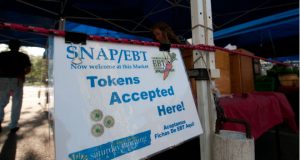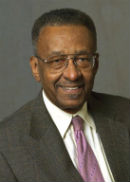 Before the massive growth of our welfare state, private charity was the sole option for an individual or family facing insurmountable financial difficulties or other challenges. How do we know that? There is no history of Americans dying on the streets because they could not find food or basic medical assistance. Respecting the biblical commandment to honor thy father and mother, children took care of their elderly or infirm parents. Family members and the local church also helped those who had fallen on hard times.
Before the massive growth of our welfare state, private charity was the sole option for an individual or family facing insurmountable financial difficulties or other challenges. How do we know that? There is no history of Americans dying on the streets because they could not find food or basic medical assistance. Respecting the biblical commandment to honor thy father and mother, children took care of their elderly or infirm parents. Family members and the local church also helped those who had fallen on hard times.
During the late 19th and early 20th centuries, charities started playing a major role. In 1887, religious leaders founded the Charity Organization Society, which became the first United Way organization. In 1904, Big Brothers Big Sisters of America started helping at-risk youths reach their full potential. In 1913, the American Cancer Society, dedicated to curing and eliminating cancer, was formed. With their millions of dollars, industrial giants such as Andrew Carnegie and John D. Rockefeller created our nation’s first philanthropic organizations.
Generosity has always been a part of the American genome. Alexis de Tocqueville, a French civil servant, made a nine-month visit to our country in 1831 and 1832, ostensibly to study our prisons. Instead, his visit resulted in his writing “Democracy in America,” one of the most influential books about our nation. Tocqueville didn’t use the term “philanthropy,” but he wrote extensively about how Americans love to form all kinds of nongovernmental associations to help one another. These associations include professional, social, civic and other volunteer organizations seeking to serve the public good and improve the quality of human lives. The bottom line is that we Americans are the most generous people in the world, according to the new Almanac of American Philanthropy — something we should be proud of.
Before the welfare state, charity embodied both a sense of gratitude on the behalf of the recipient and magnanimity on the behalves of donors. There was a sense of civility by the recipients. They did not feel that they were owed, were entitled to or had a right to the largesse of the donor. Recipients probably felt that if they weren’t civil and didn’t express their gratitude, more assistance wouldn’t be forthcoming. In other words, they were reluctant to bite the hand that helped them. With churches and other private agencies helping, people were much likelier to help themselves and less likely to engage in self-destructive behavior. Part of the message of charitable groups was: “We’ll help you if you help yourself.”
Enter the federal government. Civility and gratitude toward one’s benefactors are no longer required in the welfare state. In fact, one can be arrogant and hostile toward the “donors” (taxpayers), as well as the civil servants who dish out the benefits. The handouts that recipients get are no longer called charity; they’re called entitlements — as if what is received were earned.
There is virtually no material poverty in the U.S. Eighty percent of households the Census Bureau labels as poor have air conditioning; nearly three-quarters have a car or truck, and 31 percent have two or more. Two-thirds have cable or satellite TV. Half have at least one computer. Forty-two percent own their homes (http://tinyurl.com/448flj8). What we have in our nation is not material poverty but dependency and poverty of the spirit, with people making unwise choices and leading pathological lives, aided and abetted by the welfare state. Part of this pathological lifestyle is reflected in family structure. According to the 1938 Encyclopaedia of the Social Sciences, that year 11 percent of black children and 3 percent of white children were born to unwed mothers. Today it’s respectively 75 percent and 30 percent.
There are very little guts in the political arena to address the downside of the welfare state. To do so risks a politician’s being labeled as racist, sexist, uncaring and insensitive. That means today’s dependency is likely to become permanent.
COPYRIGHT 2018 CREATORS.COM
 Walter E. Williams is a professor of economics at George Mason University.
Walter E. Williams is a professor of economics at George Mason University.
The views expressed in opinion articles are solely those of the author and are not necessarily either shared or endorsed by Black Community News.
 CURE News and Clergy Blog News and Commentary for Christians
CURE News and Clergy Blog News and Commentary for Christians




“There are very little guts in the political arena to address the downside of the welfare state. To do so risks a politician’s being labeled as racist, sexist, uncaring and insensitive. That means today’s dependency is likely to become permanent”. I agree and could not have said it better. Sharing this on my blog, thanks.
Another problem is regulations and paperwork. In the old days, Guido or Sean just worked, saved, and as long as they had the money to open a little store or business, they could. Now it’s almost impossible for a mom and pop store to open and function.
People are afraid to start bettering themselves, because the way welfare works, especially if you let yourself get too far into it, with rent paid, etc. when you start a job, you could lose everything at once instead of Welfare taking things away gradually, one at a time. It’s almost like they are saying, “Don’t you dare even try”. The old organizations and churches would support you, lessening the support as you did better. I knew women who went on work programs, but as soon as they got a job, Welfare took away their daycare before they were ready and they wound up losing their jobs. I babysat once for a friend for free a lot because when she worked at her new job on overtime as requested by her new boss, Welfare would take that money away from her next check when there was no overtime, and she couldn’t pay. Some people or daycare centers would not accept the child like that. Welfare is almost like drugs. They get hooked. Of course, that’s the honest, normal people I’m talking about.
That’s just a little to add on to the totally accurate article and Will Stott’s accurate comments. Again, I’m talking about the normal, grateful people.
It is so unfortunate that being “poor” has become a way of life with four or five generations living off the welfare system. Today there are no checks and balances on who may sign up for benefits. Children will have a baby just to be eligible for “free” housing, “free” food stamps, “free” medical and “free” money, of course all the freebies are funded by the working taxpayers.
In socialist Rhode Island anyone citizen or non-citizen can get off a plane head for Providence and sign up for all the above “benefits”. The progressive politicians have removed any residency requirements for the non-workers.
All very true Dr. Williams. America is so different now than 100 years ago, but people do try to assist the unfortunate when they’re able.